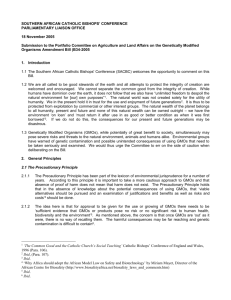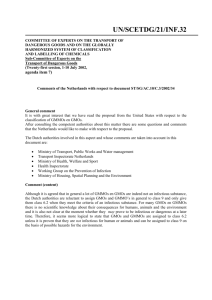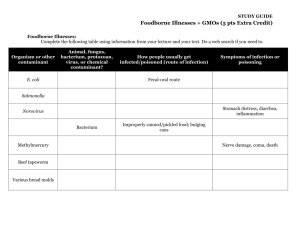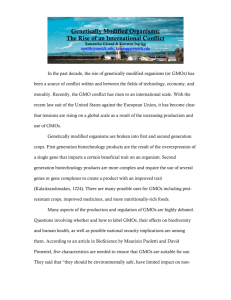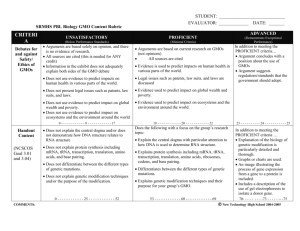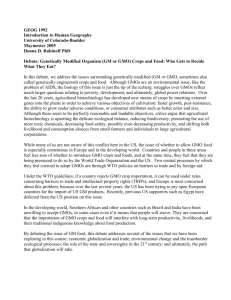Information on the Amendment to Germany´s Genetic Modification
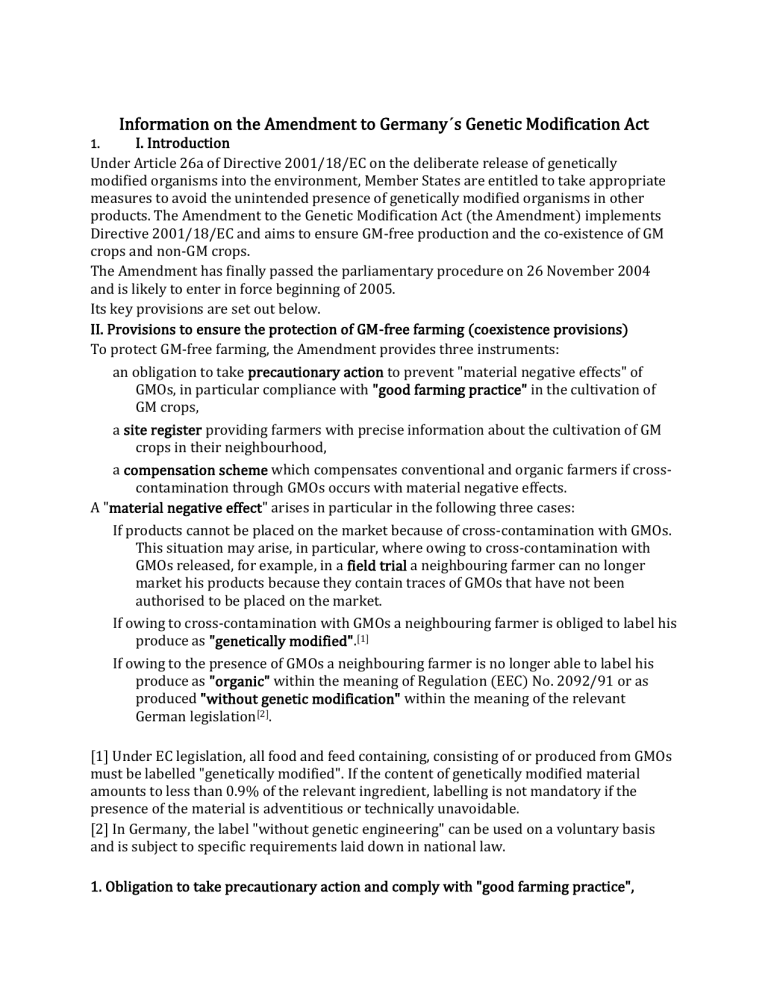
1.
Information on the Amendment to Germany ´ s Genetic Modification Act
I. Introduction
Under Article 26a of Directive 2001/18/EC on the deliberate release of genetically modified organisms into the environment, Member States are entitled to take appropriate measures to avoid the unintended presence of genetically modified organisms in other products. The Amendment to the Genetic Modification Act (the Amendment) implements
Directive 2001/18/EC and aims to ensure GM-free production and the co-existence of GM crops and non-GM crops.
The Amendment has finally passed the parliamentary procedure on 26 November 2004 and is likely to enter in force beginning of 2005.
Its key provisions are set out below.
II. Provisions to ensure the protection of GM-free farming (coexistence provisions)
To protect GM-free farming, the Amendment provides three instruments: an obligation to take precautionary action to prevent "material negative effects" of
GMOs, in particular compliance with "good farming practice" in the cultivation of
GM crops, a site register providing farmers with precise information about the cultivation of GM crops in their neighbourhood, a compensation scheme which compensates conventional and organic farmers if crosscontamination through GMOs occurs with material negative effects.
A "material negative effect" arises in particular in the following three cases:
If products cannot be placed on the market because of cross-contamination with GMOs.
This situation may arise, in particular, where owing to cross-contamination with
GMOs released, for example, in a field trial a neighbouring farmer can no longer market his products because they contain traces of GMOs that have not been authorised to be placed on the market.
If owing to cross-contamination with GMOs a neighbouring farmer is obliged to label his produce as "genetically modified".
[1]
If owing to the presence of GMOs a neighbouring farmer is no longer able to label his produce as "organic" within the meaning of Regulation (EEC) No. 2092/91 or as produced "without genetic modification" within the meaning of the relevant
German legislation [2] .
[1] Under EC legislation, all food and feed containing, consisting of or produced from GMOs must be labelled "genetically modified". If the content of genetically modified material amounts to less than 0.9% of the relevant ingredient, labelling is not mandatory if the presence of the material is adventitious or technically unavoidable.
[2] In Germany, the label "without genetic engineering" can be used on a voluntary basis and is subject to specific requirements laid down in national law.
1. Obligation to take precautionary action and comply with "good farming practice",
Section 16b
Under the Amendment, material negative effects must be avoided especially in the cultivation of GM crops, but also in other specific ways of handling GMOs such as processing.
In order to achieve this objective, the Amendment lays down various fundamental obligations, such as observance of minimum distances between fields. In addition, persons who handle GMOs commercially must be able to prove that they possess the appropriate reliability, knowledge, skills and equipment. Persons placing GMOs on the market must supply accompanying information with the product. This information must show how material negative effects can be avoided in the handling of the relevant GMO, for example through precise details of the GMO ´ s cultivation design. Rules of "good farming practice" will be issued to specify these obligations in greater detail. To enable the authorities to modify these rules in the light of future experience with the cultivation of GM crops, those marketing or handling GMOs must notify the authorities of new findings relevant to risk.
2. Site register, Section 16a
The public register foreseen in Article 31(3) of Directive 2001/18/EC will also be designed with the aim of ensuring co-existence. Therefore the public can obtain information about the location where GMOs are intended to be released. Anyone able to prove a legitimate interest will be entiteled to further information.
3. Defensive and compensatory claims under civil law, Section 36a
Cross-contamination or other GMO inputs depend on a variety of factors, such as climate or specific geographical features. Material negative effects cannot therefore be ruled out in the cultivation of GM crops even if the obligations of precautionary action and good farming practice are met.
Until now such risk has not been sufficiently covered under German civil law. The Civil
Code has defensive and compensatory provisions for material negative effects arising between adjacent properties, but these contain many undefined legal terms, giving rise to considerable legal uncertainty.
The Amendment aims to define these terms more clearly, thus creating clarity and legal certainty. This includes defining the term "material negative effects" (see above) and also clarifying the rules for burden of proof of causation, since if several neighbouring farmers cultivate GMOs it cannot always be determined after the event which one has been responsible for damage in a specific case. Under the Amendment, in principle joint and several liability of all neighbouring farmers which might have caused the crosscontamination will apply, so that a farmer who has sustained damage will be free to decide which neighbour to claim compensation from.
Thus farmers cultivating GMOs will be liable to pay compensation if they are responsible for material negative effects.
III. Other key provisions
1. Precautionary principle, Section 1
According to the Amendment, the Genetic Modification Act will include an explicit reference to the precautionary principle. This is important for the interpretation of all the provisions of the Act concerned with safety, in particular the provisions for the authorisation of deliberate releases and products. Under the precautionary principle, the
authorities may take preliminary protective measures even if there are uncertainties over the presence or extent of risks to the environment and human health without having to wait for formal confirmation of the existence and severity of these risks.
2. Monitoring, Section 16c
Under Directive 2001/18/EC, an applicant must submit a monitoring plan with any request for authorisation to market GMOs at Community level. The monitoring procedure is intended to ensure that any unforeseen effects of the GMO on human health or the environment can be traced and identified.
3. Time limit for consents, Section 16d
In accordance with Directive 2001/18/EC, consent for marketing of GMOs will be given for a maximum period of ten years. When renewing consents, the results of monitoring will be taken into account.
4. Protection of ecologically sensitive areas, Article 2 (Amendment of the Federal Nature
Conservation Act)
The Amendment contains special provisions for the protection of ecologically especially sensitive areas which form part of the "Natura 2000" network. The use and handling of
GMOs in such areas will in future only be allowed after notification to the local nature conservation authority prior to the beginning of use. The nature conservation authority can prohibit such use if a material negative effect on the area is deemed likely.
5. Cross-contamination from field trials, Section 3 (6)
Cases of GMO cross-contamination from field trials to a neighbouring field have hitherto been a controversial issue between the supervisory authorities of the L ä nder (federal states) and between various courts. Under the Amendment, cross-contaminated products cannot be placed on the market. A neighbouring farmer who as a result is no longer able to market his products can therefore claim compensation from the person conducting the field trial.
6. Authorisation authorities and bodies, Sections 4 ff., Section 16 (4)
The Amendment also provides for a stronger focus on environmental conservation in decisions by German authorities involved in the EU approval procedure. Henceforth the
Federal Agency for Nature Conservation will be involved in the finding of the German opinion, including the German position with respect to product notifications filed in other
Member States.
A new Committee which will only submit expert opinions on authorisation of field trials and marketing will be established at the existing Central Commission for Biosafety. This
Commission is a body of experts made up of natural scientists and representatives of the social groups concerned.
IV. Summary
In addition to protecting the environment and human health, the Amendment to Germany ´ s
Genetic Modification Act intends to protect conventional GM-free and organic agriculture from cross-contamination by genetically modified organisms. To this end, the Amendment includes several new provisions to protect GM-free farming. These include an obligation to take precautionary action in order to avoid material negative effects caused by GMOs (in particular by complying with "good farming practice" in the cultivation of GMOs), a site register providing farmers with information on the cultivation of GMOs in their
neighbourhood and provision for compensation claims against a GM farmer in the event of material negative effects through cross-contamination.
